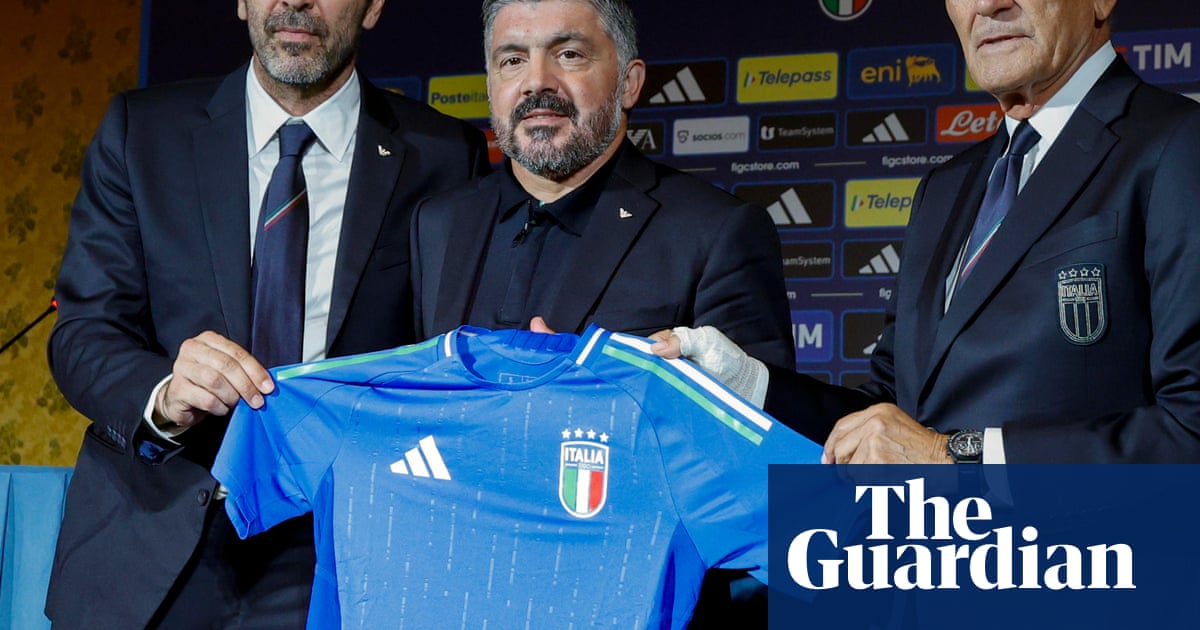Gennaro Gattuso said all the things he was expected to say at his first appearance asItalymanager. He talked about the need to restore enthusiasm to anAzzurriside whose morale has been dented by recent setbacks, as well as that sense of shared purpose that bonded him to teammates in the World Cup-winning side of 2006.
The word he kept coming back to was “family”, insisting: “That’s the most important thing, more than tactics or formations.” His is not a vision of paternalistic authority but of a group close enough to speak hard truths to each other’s faces.
“In moments of difficulty, when you feel alone and don’t hear the voice of your teammate, those are the 90 minutes that feel never-ending,” said Gattuso. “This is what we need to change. We need to help each other, we need to say those things that maybe you don’t want to hear, because that’s the only way you grow.”
They will have no shortage of material. Italy’s men’s team are at an all-time low. Havingfailed to qualifyfor consecutive World Cups, their attempts to reach next summer’s tournament are in jeopardy aftera 3-0 thrashing by Norwayin their opening game of Group I.
That result led the Italian football federation (FIGC) to sack Luciano Spalletti as manager, though he persuaded them to allow him one more game. The idea was to leave on a more positive note, and perhaps that was achieved in a2-0 win over Moldova, though the pre-game conference at which he in effect confirmed his own termination made for an awkward occasion.
How had it come to this? Spalletti’s Italy were a disappointment at the Euros last summer, putting up a feeble defence of their 2021 triumph as they scraped out of their group witha 98th-minute equaliser against Croatiabeforelosing meekly to Switzerland.
The manager had been dealt a tough hand, replacing Roberto Mancini midway through qualifying. It was easy to argue he deserved time to implement his vision after steering Napoli to their first Serie A title in 33 years. But what was the point in continuing, if the federation’s faith in him was always this fragile?
Gattuso’s appointment raises more questions about their approach. The FIGC’s president, Gabriele Gravina, confirmed on Thursday that they had approached Claudio Ranieri first. That would have been a popular choice – a man with a reputation for rescuing teams in times of emergency, fresh fromone last miraclewith his boyhood team, Roma.
But Ranieri already has a new job, moving upstairs as a senior adviser for theGiallorossi. As he explained it this week: “I respect the national team, but I belong to Roma.” Gravina sought to portray it not as a rejection but merely a respectful conversation with the club’s ownership.
Whatever the truths of that story, it is a hard pivot from Ranieri –who made Leicester championsand has written countless brilliant chapters in his almost 40 years of management – to Gattuso, who has not yet left such a mark on any of the nine clubs he has led since 2013.
There are always different ways to tell a story. Is Gattuso, 47, a man who has repeatedly fallen short of his clubs’ objectives – failing to reach the Champions League with Milan and Napoli, finishing third in Croatia with Hajduk Split and not even lasting a full season with Valencia and Marseille in between?
Sign up toFootball Daily
Kick off your evenings with the Guardian's take on the world of football
after newsletter promotion
Or is he, as his former Italy teammate Gigi Buffon – head of delegation for theAzzurriat Euro 2024 and seemingly moving into a more prominent role for the federation – argued on Thursday, a person who has shown courage to go to different countries and take on different challenges, continuing to grow and to evolve?
Defending his own work, Gattuso pointed out his Milan and Napoli sides each missed the top four by one point, and that his Hajduk team this season were in with a shot at their first league title in 19 years going into the final weekend.
All of which can be well and true, but in his new job there will be no grey area: only success or failure. For Italy to miss a third consecutive World Cup ought to be unthinkable, but the lopsided nature of their defeat by Norway, who have played two more games and won both, means even a perfect record from here on may only land them back into the playoffs from which they have failed to progress in each of the past two cycles.
If the goal were only to make Italy a family again, Gattuso would have every chance of success. His presence at the podium alongside Buffon felt like a homecoming, albeit an understated one, the heroes of 2006 given their opportunity to lead. Journalists prefaced questions not with deferential honorifics but instead a familiar “ciao Rino”.
In the end, though, the requirements of this job remain the same as they always were. Gattuso needs to win, starting with his first game, at home to Estonia in September. This family is sick of losing. He will hear hard truths soon enough, and from more people than he may care to, if he cannot make it stop.
